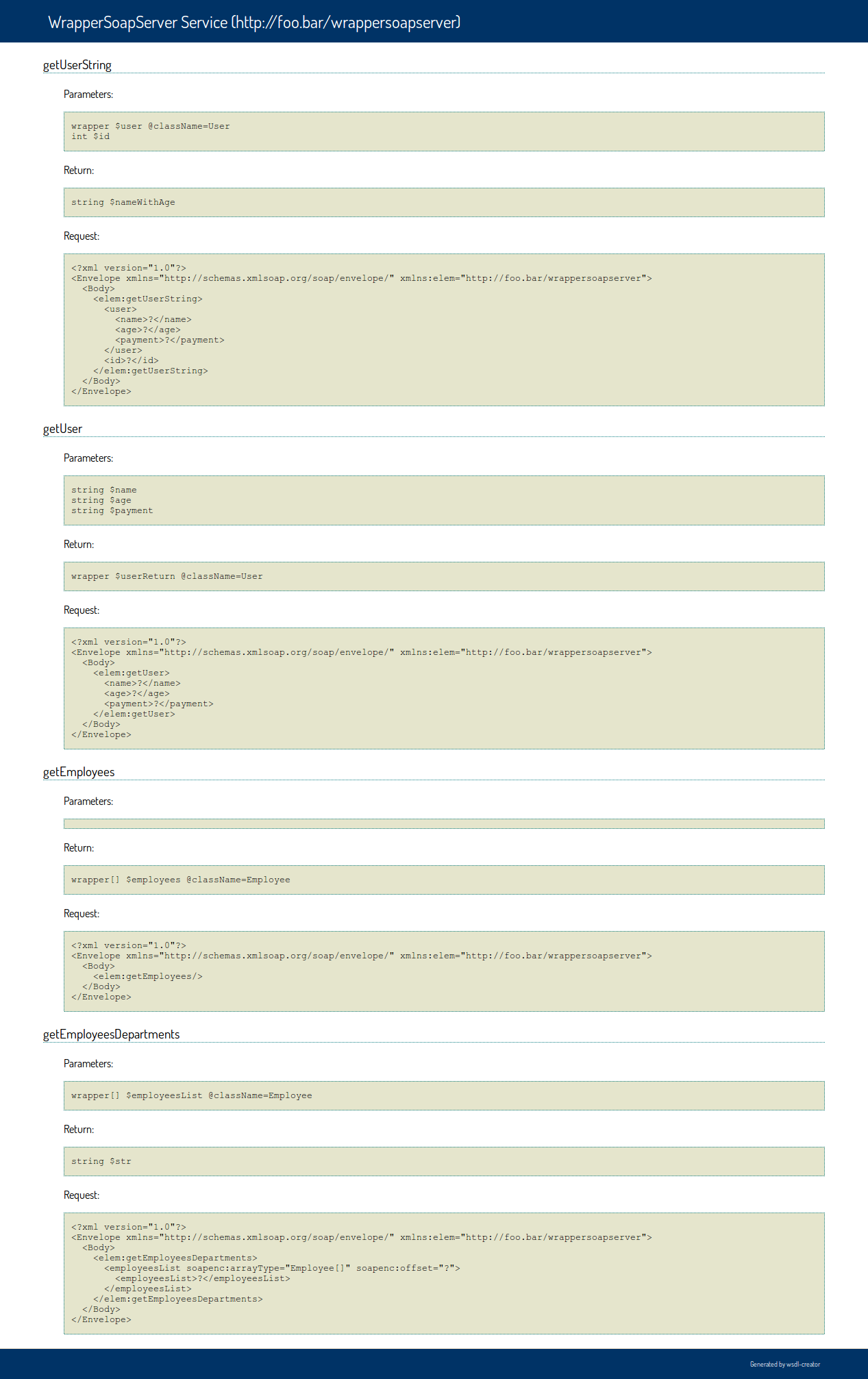georgo / wsdl-creator
PHP WSDL creator using PHPdoc (annotations, reflections).
Installs: 17 997
Dependents: 0
Suggesters: 0
Security: 0
Stars: 5
Watchers: 3
Forks: 52
pkg:composer/georgo/wsdl-creator
Requires
- letsdrink/ouzo-goodies: 1.5.0
Requires (Dev)
- phpunit/phpunit: 4.7.5
- satooshi/php-coveralls: dev-master
- symfony/console: v2.7.1
README
Introduction
WSDL creator allows generating WSDL documents based on PHP classes using annotations and reflection mechanism. This generator also give possibilty to generating overview methods and parameters with SOAP examples used in WSDL.
Support: >= PHP5.5.
Installation
To install wsdl-creator at your project use composer.
###Create new project:
composer.phar create-project georgo/wsdl-creator myproject
###or add to the composer.json file:
require: {
"georgo/wsdl-creator": "1.*"
}
Configuration
To start working with creator you must create new WSDLCreator object and define for him:
- class to generate
WSDL SOAPserver location- documnet namespace.
$wsdl = new WSDL\WSDLCreator('ClassName', 'http://localhost/wsdl-creator/ClassName.php'); $wsdl->setNamespace("http://foo.bar/");
SOAP server must be created in location specified in WSDLCreator.
$server = new SoapServer(null, array( 'uri' => 'http://localhost/wsdl-creator/ClassName.php' )); $server->setClass('ClassName'); $server->handle();
To render XML use method renderWSDL. To properly load generator classes use composer loader which is in vendor/autoload.php.
Full configutaion listing:
require_once 'vendor/autoload.php'; use WSDL\WSDLCreator; if (isset($_GET['wsdl'])) { $wsdl = new WSDL\WSDLCreator('ClassName', 'http://localhost/wsdl-creator/ClassName.php'); $wsdl->setNamespace("http://foo.bar/"); $wsdl->renderWSDL(); exit; } $server = new SoapServer(null, array( 'uri' => 'http://localhost/wsdl-creator/ClassName.php' )); $server->setClass('ClassName'); $server->handle();
Now if we try call address http://localhost/wsdl-creator/ClassName.php?wsdl you recive WSDL document.
Define web service method
To define is a web service method you must use @WebMethod annotation.
Simple type
Simple types are described here.
###Usage
/**
* @param string $name
*/
So you type @param next type one of simple types (string) after name of variable ($name).
You can also use arrays of the simple types.
###Usage
/**
* @param string[] $names
*/
In input parameter now you must define what type of array you pass (string[]).
###Example
###Annotations
- @desc Method description
- @param type $varialbe_name
- @return type $return
Wrapper type
Wrapper types are user defined clases which you can generate WSDL complex types.
###Usage
/**
* @param wrapper $user @className=User
*/
You must define class User with public fields and doc comments which contains field type as example:
class User { /** * @type string */ public $name; /** * @type int */ public $age; }
This mechanism use reflection, i.e. User class must be visible to the generated class - possible use namespaces (\Namespace\To\User).
You can define arrays of wrappers.
###Usage
/**
* @return wrapper[] $users @className=User
*/
This annotation will generate array of users.
###Example
###Annotations
- @desc Method description
- @param wrapper[] @className=ClassName
- @return wrapper @className=\Namespace\To\ClassName
Object type
You can dynamically create object at runtime. Use object parameter type.
###Usage
/**
* @param object $info @string=$name @int=$age
*/
This annotation create complex type with name and age elements.
Also you can wrapp classes in object.
###Usage
/**
* @return object $userNameWithId @(wrapper $user @className=User) @int=$id
*/
Above example will return UserNameWithId object which contains pointer to User complex type and int type.
Another option is creating array of objects.
###Usage
/**
* @param object[] $payments @float=$payment @string=$user
*/
This annotation creata array of objects with payment and user on each element of array.
###Example
###Additional info
In object you can use array of wrappers and array of simple types.
###Annotations
- @desc Method description
- @param object $object @type1=$name1 @type2=$name2
- @param object $object @(wrapper $nameWrapper @className=User) @type1=$name1
- @param object[] $object @type1[]=$name1
- @return
Service overview
You can generate service overview through renderWSDLService method. This show all infos about method and parameters used in service with sample SOAP request.
###Example
Styles
By default, the WSDLCreator will generate WSDLs using the rpc/literal binding style.
To specify rpc/encoded or a wrapped document/literal binding style, set the binding style on the WSDLCreator object.
$wsdl = new WSDL\WSDLCreator('ClassName', 'http://localhost/wsdl-creator/ClassName.php'); @wsdl->setBindingStyle(new WSDL\XML\Styles\RpcEncoded()); $wsdl->setNamespace("http://foo.bar/");
When specifying the wrapped document/literal binding style, you can use WSDL\DocumentLiteralWrapper to automatically wrap the returning value in an appropriate wrapped object.
require_once 'vendor/autoload.php'; use WSDL\DocumentLiteralWrapper; use WSDL\WSDLCreator; use WSDL\XML\Styles\DocumentLiteralWrapped; if (isset($_GET['wsdl'])) { $wsdl = new WSDLCreator('ClassName', 'http://localhost/wsdl-creator/ClassName.php'); @wsdl->setBindingStyle(new DocumentLiteralWrapped()); $wsdl->setNamespace("http://foo.bar/"); $wsdl->renderWSDL(); exit; } ini_set('soap.wsdl_cache_enabled', '0'); $server = new SoapServer('http://localhost/wsdl-creator/ClassName.php?wsdl', array( 'style' => SOAP_DOCUMENT, 'use' => SOAP_LITERAL, )); $server->setObject(new DocumentLiteralWrapped(new ClassName())); $server->handle();

